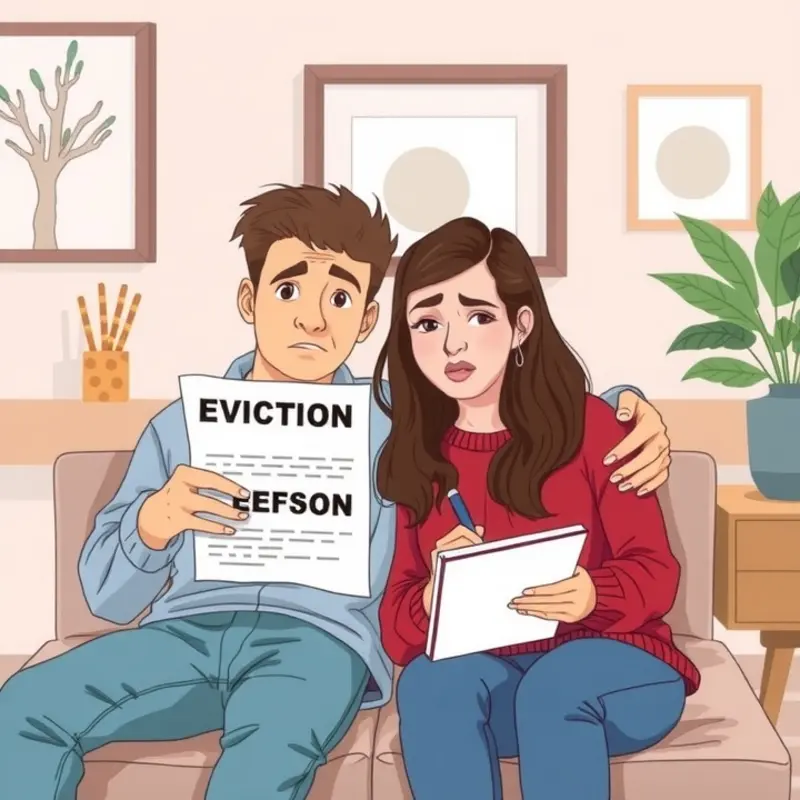Receiving an eviction notice can be a daunting experience for anyone, especially for young professionals, first-time renters, and families. The uncertainty and fear that come with potential housing instability can be overwhelming. However, understanding your rights and exploring the options available can significantly alleviate stress and empower you to take control of your housing situation. This guide aims to provide clear, actionable steps to handle eviction notices, ensuring you retain your financial clarity and overall peace of mind. Whether you’re a student navigating lease agreements for the first time or a couple concerned about stability, the right knowledge can make all the difference. Let’s delve into practical solutions that can help you manage and respond effectively to eviction notices.
Understanding Eviction Notices: Know Your Rights

Facing an eviction notice can be a daunting experience, especially for renters not familiar with housing laws. To effectively navigate this situation, it’s crucial to understand the legal framework surrounding eviction notices and tenant rights. Familiarity with these elements empowers renters to make informed decisions and seek proper recourse when necessary.
Eviction notices are legal documents landlords issue to inform tenants of a lease violation or the requirement to vacate a property. These notices are governed by state and local laws, which dictate how and when they should be served. Federal laws also offer protections through the Fair Housing Act and other legislation aimed at preventing discrimination and ensuring fair treatment.
To begin understanding your rights, determine the grounds for eviction specified in the notice. Common grounds include non-payment of rent, violation of lease terms, and illegal activities. Once identified, review the notice for compliance with legal requirements, such as the inclusion of all necessary information and adherence to the proper notice period.
Each state has specific regulations concerning eviction procedures, and local jurisdictions may have additional rules. For example, some areas require landlords to give tenants a ‘pay or quit’ notice, which demands the settlement of owed rent within a certain timeframe. If in error, these notices may be contestable, and renters can seek clarification or correction by resolving disputes with management.
Upon receiving an eviction notice, it’s essential to act promptly. Read the document thoroughly, paying attention to any stated timelines. If applicable, rectify the cited issue immediately, such as catching up on overdue payments. If you believe the eviction is unjust or the notice improper, consider contesting it in court. Many localities offer free or low-cost legal aid to guide tenants through this process.
Additionally, tenants have a right to due process, meaning landlords must follow legal eviction procedures. They cannot forcibly remove you or shut off utilities without a court order. If you’re facing an illegal or retaliatory eviction—for example, evicted for reporting property code violations to local authorities—such actions may be deemed unlawful.
For first-time renters and families, these experiences can be incredibly stressful. However, maintaining open communication with your landlord may prevent escalation. If in doubt about a notice’s validity or your legal standing, consulting with a legal advisor knowledgeable in tenant law is advisable.
Understanding the eviction process, knowing your rights, and taking appropriate, timely actions can help navigate the complexities of eviction notices calmly and effectively. By maintaining documentation and utilizing available resources, tenants can better protect themselves against unfair practices.
Taking Action: Steps to Respond to Eviction Notices

When faced with an eviction notice, swift and strategic actions are essential. The first step is to communicate openly with your landlord. Reach out promptly to understand the specific reasons behind the eviction. Whether it’s missed payments or lease violations, clarity will help you assess the situation accurately. This communication not only shows your willingness to resolve issues but can sometimes halt the eviction process altogether.
Next, consider seeking legal counsel. Many cities offer free or low-cost legal advice to tenants facing eviction. Legal professionals can provide you with guidance tailored to your case, helping you understand your rights and potential defenses. Ensure you gather all relevant documents, such as the lease agreement, any correspondence with your landlord, and the eviction notice itself, to facilitate a detailed discussion.
In scenarios where missed rent payments are the issue, negotiating a payment plan could be a viable option. Approach your landlord with a realistic and feasible proposal that outlines how and when you will settle outstanding rent. Be honest about your financial situation, and demonstrate your commitment to fulfilling your financial obligations. This can often lead to a written agreement that prevents further legal action.
Understanding your right to contest the eviction is crucial if you believe the notice to be unjustified. Review your local tenancy laws to determine whether the eviction notice followed proper legal channels. If discrepancies exist, you can file a motion to contest the eviction in court. This process will provide you with an opportunity to present your case before a judge, potentially stopping the eviction.
It’s also wise to explore broader financial planning for renters to prevent future eviction scenarios. Developing a robust budget that accommodates rental and living expenses can create a buffer against potential financial hiccups. For helpful tips on better managing your rental finances, take a look at financial planning for renters. Establishing a well-planned budget can provide stability and lessen the risk of falling behind on payments.
Throughout this process, maintaining detailed records is essential. Documenting all interactions, agreements, and legal steps taken can prove invaluable. These records may be critical during court proceedings or future negotiations. Staying organized ensures you have quick access to necessary information when needed.
While an eviction notice can be daunting, taking informed and proactive steps can greatly impact the outcome. By communicating effectively, using legal resources, and thoroughly understanding your rights, you can better navigate the challenging situation of facing eviction.
Final words
Handling an eviction notice can feel daunting, but remember, knowledge is your best ally. By understanding your rights and exploring your options, you empower yourself to take informed actions. Whether it’s negotiating with your landlord or seeking legal advice, staying proactive is crucial. Always document your communications and seek assistance when needed. In challenging times, lean on your community and resources available to you. The goal is to find a resolution that allows you to maintain your home, stability, and peace of mind for yourself and your family.









